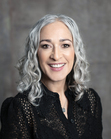Sanjida Kay's Blog
November 6, 2025
Not long to go! Masterclass on How to Write Short Stories
I had my very first short story published when I was 18 in Spare Rib magazine. I wrote a lot of short stories between then and finishing my PhD, which is when my first novel, Theory of Mind, was published. And after that, not so much. My focus was firmly fixed on novels and non-fiction full length books.
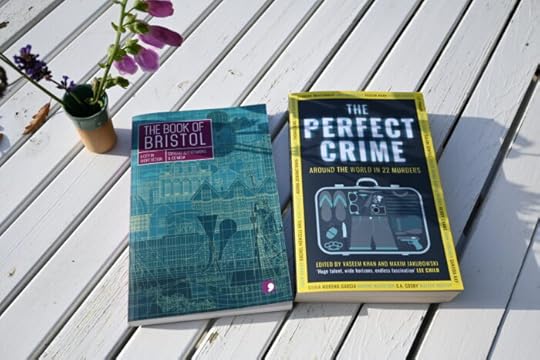
It’s only in the past few years that I’ve returned to the short form. The Divide, in The Book of Bristol, won a CWA Dagger and the year before, The Beautiful Game in The Perfect Crime was short listed. I have another two stories coming out soon, plus one on BBC Radio 4 and I’m now compiling my own anthology, provisionally entitled, Dark Nature, to be published by Comma Press.
So I’m delighted to be hosting and part of a forthcoming masterclass on How to Write Short Stories.
https://www.sanjida.co.uk/wp-content/uploads/2025/11/Short-story-promo-full-size.mp4
I’ll be joined by two award-winning writers, Ken Elkes and Brontë Schiltz, as well as editor and former coordinator of The Bristol Short Story Prize, Joe Melia.
Book via Luma
We’ll explore:
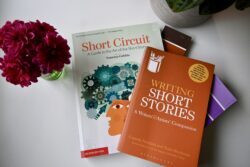 How to develop your story from a first draft to a polished piece (Ken Elkes)How to create tone, atmosphere and affect in Gothic fiction — making your stories feel the way you want them to feel (Brontë Schiltz)Ways to shape plot and voice in short thriller fiction (Sanjida Kay)Recommendations for how to get your stories published, increase your chances in competitions, and discuss what editors may be looking for (Joe Melia).
How to develop your story from a first draft to a polished piece (Ken Elkes)How to create tone, atmosphere and affect in Gothic fiction — making your stories feel the way you want them to feel (Brontë Schiltz)Ways to shape plot and voice in short thriller fiction (Sanjida Kay)Recommendations for how to get your stories published, increase your chances in competitions, and discuss what editors may be looking for (Joe Melia).
We’ll also discuss why there is no single ‘right way’ to write, and share destinations for your fiction — from journals to competitions to anthologies.
The session will finish with a live Q&A, giving you the chance to ask questions about writing and publishing your own work.
You’ll also receive a bonus downloadable handout of writing exercises, tips and references from each writer and editor to develop your skills further.
Date/Time: 7.30 – 9pm Tuesday 9 December
Book: https://luma.com/czorgssu
I know that I personally will learn a lot from my Ken, Brontë and Joe, and I’ve been enjoying re-reading all my short story craft books in preparation!
I do hope you can join us.
Sanjida x
PS You might be interested in this series of essays on how to write a short story. I take you through my process from start to finish, using a short story called, Meat, which will be out in The Monster, Capital soon.
The post Not long to go! Masterclass on How to Write Short Stories appeared first on Sanjida.
November 5, 2025
Not long to go! Masterclass on Historical Fiction
I’m furiously prepping for the masterclass on How to Write Historical Fiction, which I’m running with (mainly interviewing!) Emma Darwin.
https://www.sanjida.co.uk/wp-content/uploads/2025/11/Historical-fiction-full-size.mp4
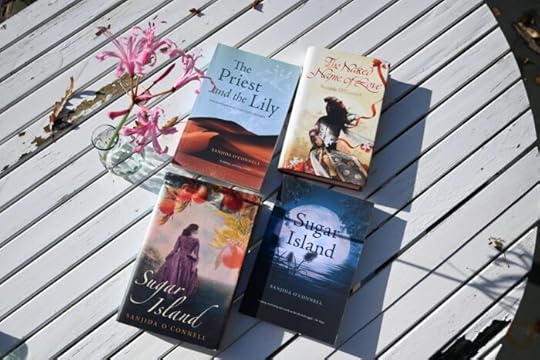
I’ve written two historical fiction novels, Sugar Island and The Priest and the Lily, so I’m no stranger to the months (years?!) of research it can take to make a story feel authentic – and yet you don’t want your reader to feel as if they’re wading through the entire British Library as they delve into your book. You simply want to immerse the reader in another time and place…
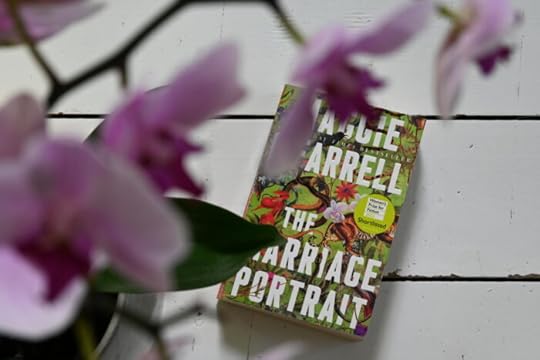
I’ve been reading Emma’s new book, The Bruegel Boy, as well as her text book (which I’d highly recommend getting) Get Started in Historical Fiction, as well as reading some beautiful historical novels, including The Marriage Portrait by Maggie O’Farrell.
7-8.30 pm GMT Wednesday 26 NovemberYou can book on Luma: https://luma.com/0m0ddh4y
We’ll be discussing:
What makes historical fiction resonate with modern readersHow to balance research with storytellingCreate authentic characters and dialogueFind the right voice for your periodAvoid common pitfalls in the genreWhy and how Emma set about writing a novel set in the 16th century Low Countries (the forthcoming The Bruegel Boy ) – and what happened when she did.There will be plenty of time for questions, and you’ll also get a take-home handout with tips and practical exercises to develop your own writing.
Hope to see you there!
PS You might be interested in this post about the opening scene in The Marriage Portrait by Maggie O’Farrell:
How to hook a reader from the very start of your novel
The post Not long to go! Masterclass on Historical Fiction appeared first on Sanjida.
October 2, 2025
New Short Story about the Search for Extraterrestrial Life
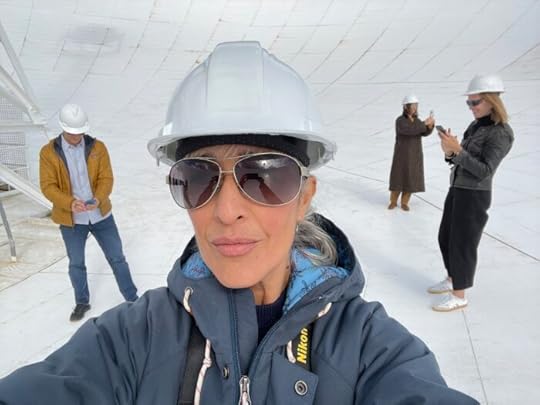
Is there anyone out there?!
I’ve just had an incredible day at Jodrell Bank seeing the Lovell Space Telescope. I’ve been commissioned to write a short story for an anthology to be published by Comma Press inspired by Jodrell Bank and the new Square Kilometre Area Observatory.
All the writers for the anthology were able to see the control room (don’t touch the red button!!), climb the 300m high telescope (which included walking along a gang way suspended 50 m above ground!!) and stand inside the dish below the radio mast. I also got to meet “my” astronomer IRL – Louisa Mason – who is helping with the factual aspect of the short story. Anyone how knows me well, will know that physics isn’t really my forte so she has her work cut out! A magical, extraordinary and mind-bending experience. My short story is about the search for extra terrestrial life!
I’ve already started writing. I’ll let you know when the anthology is out!

The post New Short Story about the Search for Extraterrestrial Life appeared first on Sanjida.
Masterclass on How to Write Short Stories
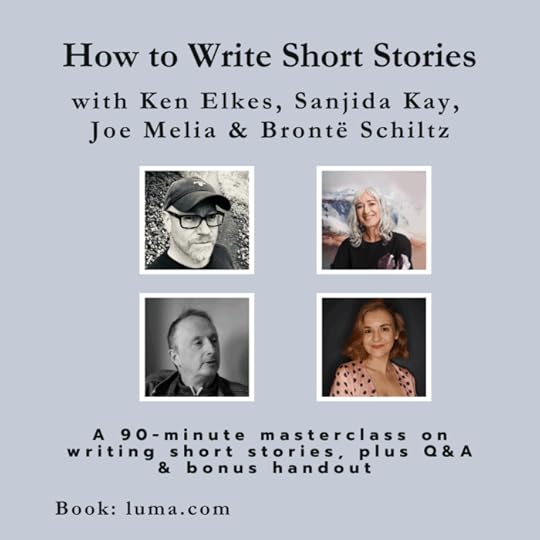
 New masterclass alert!
New masterclass alert!
I’m thrilled to be running an online event on How to Write Short Stories with three brilliant award-winning guests:
 Ken Elkes – on how to take your story from first draft to polished piece
Ken Elkes – on how to take your story from first draft to polished piece Bronte Schiltz – on creating tone, atmosphere and affect in Gothic fiction
Bronte Schiltz – on creating tone, atmosphere and affect in Gothic fiction Me, Sanjida Kay – on shaping plot and voice in short thriller fiction
Me, Sanjida Kay – on shaping plot and voice in short thriller fiction Joe Melia – recommendations for getting published, do your best in competitions, and what editors might be looking for
Joe Melia – recommendations for getting published, do your best in competitions, and what editors might be looking for
It’s a 90-minute online masterclass with a live Q&A and a handout of practical tips and exercises to take away.
We’ll be talking about process, about how there’s no single ‘right’ way to write, and about destinations for your short fiction — from competitions to journals and beyond.
 Date: Tuesday 9 December
Date: Tuesday 9 December Time: 7.30-9pm GMT
Time: 7.30-9pm GMT Tickets: Book via Luma
Tickets: Book via Luma
Come and join us — and give your stories the best chance of being read, remembered and published.
The post Masterclass on How to Write Short Stories appeared first on Sanjida.
September 30, 2025
Masterclass on How to Write Historical Fiction
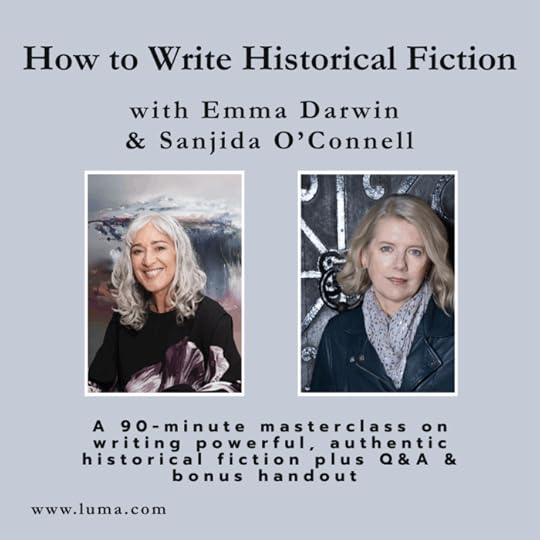 I’m so delighted to be hosting a masterclass with
Emma Darwin
on How to Write Historical Fiction. Emma is the bestselling author of the newsletter,
This Itch of Writing
, an invaluable guide to the craft of writing. Emma is also the author of prize-nominated and best selling historical novels,
The Mathematics of Love
and
A Secret Alchemy
, and the acclaimed guide
Get Started in Writing Historical Fiction
. She has a third historical novel out in November called,
The Bruegel Boy
. I’ve also written two historical novels,
The Priest and the Lily
and
Sugar Island
(as Sanjida O’Connell). In our masterclass, How to write Historical Fiction, we’ll be discussing:* What makes historical fiction resonate with modern readers* How to balance research with storytelling* Create authentic characters and dialogue* Find the right voice for your period* Avoid common pitfalls in the genre* Why and how Emma set about writing a novel set in the 16th century Low Countries (the forthcoming The Bruegel Boy) – and what happened when she did.There will be plenty of time for questions, and you’ll also get a take-home handout with tips and practical exercises to develop your own writing.As well as writing, between us we’ve taught, mentored and advised thousands of writers – and would love to help you. Do join us!
I’m so delighted to be hosting a masterclass with
Emma Darwin
on How to Write Historical Fiction. Emma is the bestselling author of the newsletter,
This Itch of Writing
, an invaluable guide to the craft of writing. Emma is also the author of prize-nominated and best selling historical novels,
The Mathematics of Love
and
A Secret Alchemy
, and the acclaimed guide
Get Started in Writing Historical Fiction
. She has a third historical novel out in November called,
The Bruegel Boy
. I’ve also written two historical novels,
The Priest and the Lily
and
Sugar Island
(as Sanjida O’Connell). In our masterclass, How to write Historical Fiction, we’ll be discussing:* What makes historical fiction resonate with modern readers* How to balance research with storytelling* Create authentic characters and dialogue* Find the right voice for your period* Avoid common pitfalls in the genre* Why and how Emma set about writing a novel set in the 16th century Low Countries (the forthcoming The Bruegel Boy) – and what happened when she did.There will be plenty of time for questions, and you’ll also get a take-home handout with tips and practical exercises to develop your own writing.As well as writing, between us we’ve taught, mentored and advised thousands of writers – and would love to help you. Do join us! 7-9.30 pm GMT Wednesday 26 NovemberYou can book via Luma: How to write Historical Fiction: A Masterclass with Emma Darwin and Sanjida O’Connellluma.com/0m0ddh4yJoin our newsletters on Substack to receive a 20% discount code
7-9.30 pm GMT Wednesday 26 NovemberYou can book via Luma: How to write Historical Fiction: A Masterclass with Emma Darwin and Sanjida O’Connellluma.com/0m0ddh4yJoin our newsletters on Substack to receive a 20% discount code Wild Writing with Sanjida
Wild Writing with Sanjida
 This Itch of Writing with Emma Darwin
This Itch of Writing with Emma Darwin
The post Masterclass on How to Write Historical Fiction appeared first on Sanjida.
September 3, 2025
New book, ‘You are Enough’, is out now!
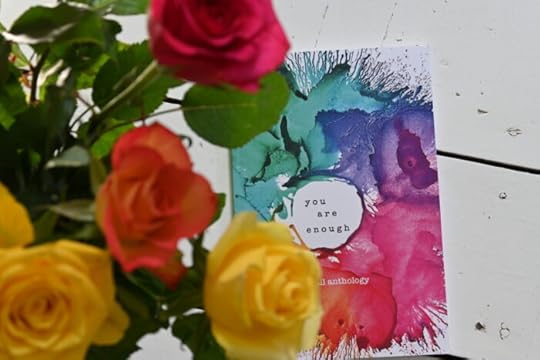
I’m delighted to have an essay in this anthology, ‘You are Enough’ edited by Robin Taylor and Robin Cangie, published by Small Robin Press and out now.
My article is on why having a small number of friends is all our brains can cope with  and explains what that magic number is. It’s based on research I did as a primatologist, and on the brilliant, ground-breaking ideas of my then supervisor, Professor Robin Dunbar.
and explains what that magic number is. It’s based on research I did as a primatologist, and on the brilliant, ground-breaking ideas of my then supervisor, Professor Robin Dunbar.
Appropriately, the book is on why small is beautiful.
Here’s the blurb: “A collection of resilient voices share their personal takes on what makes their size–or lack thereof–powerful. From illness diagnosis to art, finding community to baking delicious recipes, eight outstanding authors provide their insight into what makes small just the right size.”
Available to buy from Small Robin Press.
The post New book, ‘You are Enough’, is out now! appeared first on Sanjida.
April 3, 2025
Short story, ‘Meat’, is coming soon!
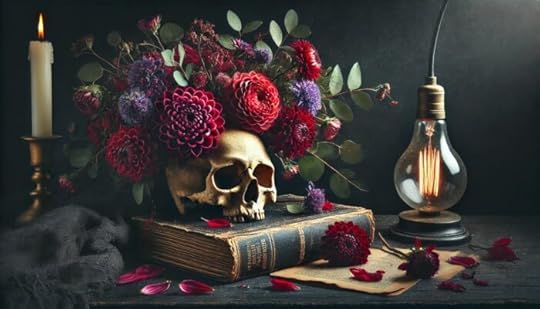
My short thriller, Meat will be published in The Monster Capital: Tales of Unease for our Times, by Comma Press, soon (June 2025 at the moment).
Here’s what the story is about:
Lily is an artist about to stage her first solo show in her husband, Lar’s gallery. Determined to make it a success, she decides to create living Memento mori sculptures featuring her husband’s lab-grown meat. But as the opening of the show is almost upon them, Lily will discover the consequences of her decision, and the dark secrets her husband has been keeping from her.
If you’re interested in seeing how I came up with the idea, I’ve written about my process in my newsletter.
This is what the anthology is about:
There is something monstrous about capital, something alive and creeping about it. It’s been compared to a parasite, a vampire, a zombie-maker; one that transforms human lives into dead labour, and marshals all creative, free-thinking individuality into the long trudge that is work, money-making, aspiration. The philosopher Mark Fisher famously compared capital to the alien in John Carpenter’s The Thing: an ‘infinitely plastic entity capable of metabolising and absorbing anything with which it comes into contact.’ For the latest book in its acclaimed horror series, Comma has invited ten authors to explore this emergent, monstrous property of capital through supernatural and surreal means. Thus, we see characters disappearing into algorithm-driven spending addictions, property development spreading like a virus across cityscapes leaving buildings empty and people homeless, and citizens so addicted to the ‘news drug’ that promises everything is about to change that nothing does. We may think of capitalism as the ghost in the machine, driving things forward. But what happens when we become the ghosts?
It’s available to pre-order here.
The post Short story, ‘Meat’, is coming soon! appeared first on Sanjida.
November 16, 2023
The Divide is out now!
My short story, The Divide, has been published in The Book of Bristol, edited by Heather Marks and Joe Melia and published by Comma Press.

The Book of Bristol is an anthology of short stories by Bristol-based writers, including one by the late Helen Dunmore. My story, The Divide, is a psychological thriller about a young man, Matthew, who is waiting for his girlfriend in an upmarket restaurant. He’s going to ask her to move in with him – but she doesn’t turn up. Increasingly worried, he starts to think something terrible has happened – only no one takes him seriously when he reports her missing. And the strange thing is, he can’t find any evidence to prove to the police that she was his girlfriend, and that he had nothing to do with what might have befallen her…
‘Who needs evidence when you have a young black man with a murdered girlfriend, who claims another white woman is missing, and the one person who vouched for him is in a graveyard he’s never visited, in a country he’s never been to?’
‘The flat smells strange. It smells of bleach. …But nothing can get rid of blood.’I’ve lived in Bristol for a long time – off and on since I was a student. When I first arrived I loved it so much I made a pledge that I would live here permanently as soon as I could. And as soon as I was a producer/director at the BBC in London, I moved back to work for the BBC and Bristol-based TV independents.
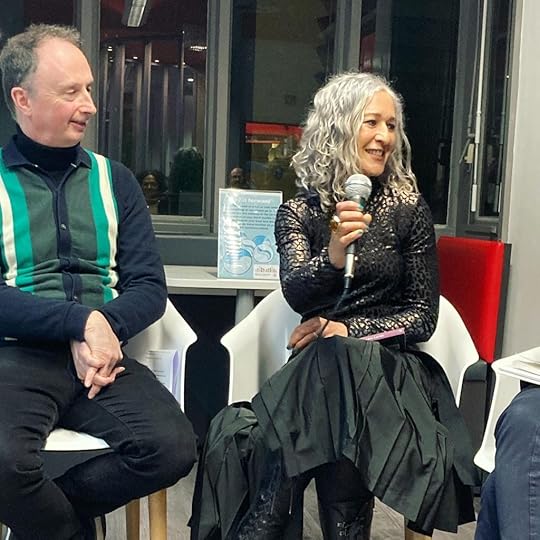
Bristol is a vibrant city, full of art and culture; it’s hip and cool and beautiful. I love how you can walk from one end to the other. I love the way the rivers and the harbours are woven through the city and it cradles pockets of nature and mini wildernesses. But it is also a city with strong roots in the slave trade, which I wrote about in my book, ‘Sugar: The Grass that Changed the World.’ When I first arrived it was a city riven with inequality – race, class, poverty. I had never lived anywhere in the UK that felt so segregated. And sadly, it still feels like that to me today.
So although my story is a thriller about a young man with a missing girlfriend, it’s called ‘The Divide’ for a reason.
May 4, 2022
‘The Beautiful Game’ – Filled with dread
‘The Perfect Crime’, a collection of crime fiction short stories by diverse writers, is reviewed by Peter Kalu on Writers Mosaic. Peter says, ‘There are some blazingly good crime short stories here. ‘ And of my short story, he has this to say:
Sanjida Kay talking about ‘The Beautiful Game’Sanjida Kay reading from ‘The Beautiful Game’‘The Beautiful Game’ by Sanjida Kay has young-and-starstruck, half-Nigerian Selene Jackson meet £100 million Manchester footballer, Luke Allard, in a bar. The story is filled with dread while being simultaneously good fun.
March 24, 2022
The Writer as an Outsider
‘As writers, we are all anthropologists, observing the natives and commenting on their customs. As writers, we can tap into that feeling of being an outsider in order to document the human soul.’
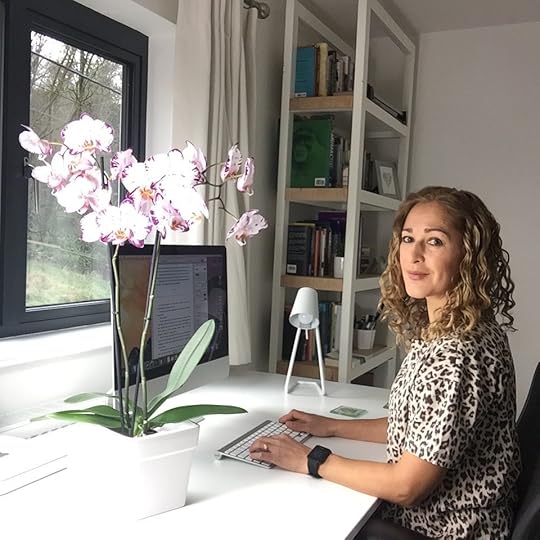
Sanjida O’Connell
Virginia Woolf wrote, ‘For a long while I have believed…that in every generation there are a few souls, call them lucky or cursed, who are simply born not belonging, who come into the world semi-detached…without strong affiliation to family or location or nation or race.’
I’ve long believed that too, and that I was one of these people; not because I was born that way, but because of how I was brought up. My three parents were from Dacca, in Bangladesh; Cork, in Ireland, and Belfast, in Northern Ireland. They were Muslim, Catholic and Protestant. When I was a child, we moved frequently, changing continents, countries, regions. I went to a Nigerian school, where I was one of the few children who wasn’t African; an all-Welsh speaking school when I do not know a single word of Welsh, and a further nine schools were I was the only person who wasn’t white. I was a double-edged outsider – mixed-race Irish, where even in Ireland, the place I thought I belonged, none of the residents believed I did.
Growing up, I struggled to find my place in the world: Who was I? Where was I from? I had no home, race, tribe, religion, people or nation I could point to and categorically say: There, that is me, they are mine. Being an outsider, though, I have come to realise, is a gift. It allows me to observe others, both with a surfeit of empathy, as well as a measure of dispassion. As Simone de Beauviour wrote, ‘In every society, the artist or writer remains an outsider.’ I studied anthropology as part of my degree in zoology, learning about the Kung bush people of the Kalahari, the Hadza of Tanzania and the Himba of Namibia. But as writers, we are all anthropologists, observing the natives and commenting on their customs. As writers, we can tap into that feeling of being an outsider in order to document the human soul.
And whilst not everyone is born or brought up as an outsider, it is both a contradiction and yet a universal truth that most, if not all of us, will at some point feel that we do not belong, or that we have been left out, even if it is as seemingly small as being excluded from a conversation, or as astronomically large as being one third of the human race who do not have access to fresh water. As author, Elizabeth Day, writes, ‘I often find myself feeling as if I’m pressing my nose up against the window, looking at an untouchable group I cannot be part of.’
Although it’s a human need to belong, many of us, in ways both large and small, do not, and as a result, we champion ‘The Outsider’ in our stories. As Salman Rushdie writes in The Ground Beneath her Feet, why else would we celebrate ‘the non-belongers, the different ones, the outlaws, the freaks’?
My father was no stranger to being an outsider himself, given that he was originally a poverty-stricken orphan from Cork, then a Catholic priest preaching to the Yoruba in Nigeria, before becoming a Professor of Peace Studies in Yorkshire and father to four small children. When I was a teenager, flailing and failing to find my place he would quote Virginia Woolf to me: ‘As a woman, I have no country. As a woman, I want no country. As a woman, my country is the whole world.’
And I would add: As writers, our country is the whole world.
What do you think? Do writers need to be at least partly on the margins of society, community, culture?

